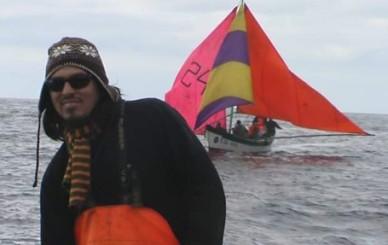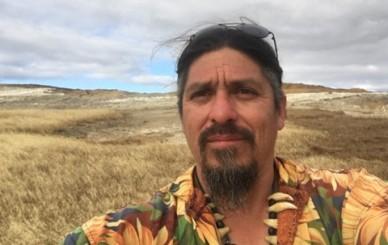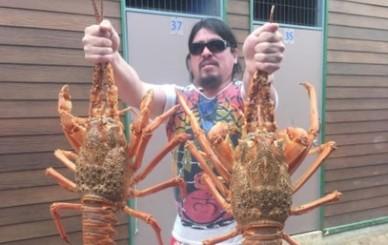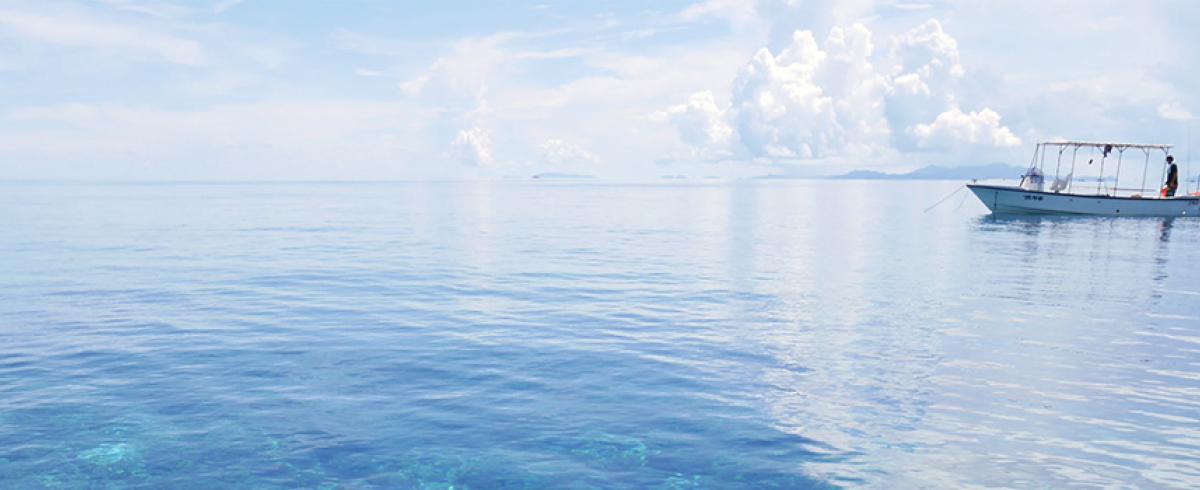
Julio Manuel Chamorro Solis
is a lifelong resident of the Juan Fernández archipelago, a group of islands west of mainland Chile. Like most of the people in Juan Fernández, Julio comes from a family of fishermen and has been involved in small-scale fishing for most of his life. He has held many positions, but all of them revolve around small-scale fisheries. Julio has been a champion of helping small-scale fishing communities throughout the archipelago and throughout Chile. He also works for the University of Concepcion doing biological monitoring of fisheries and the ecosystem of the Juan Fernández archipelago. He has been a member of the Chilean Small-scale Fisheries Learning Network (Red de Aprendizaje de Pesca Artesanal de Chile) since the network was founded in 2017. Julio has worked with many small-scale fishing communities with a myriad of goals that they have, including developing marine protected areas (MPAs) and multispecies fishery management plans.
Environmental Defense Fund (EDF) SSF Summer Intern, Juan Camara, sat down with Julio for an interview. Read their exchange below:
Lea la entrevista en español aquí
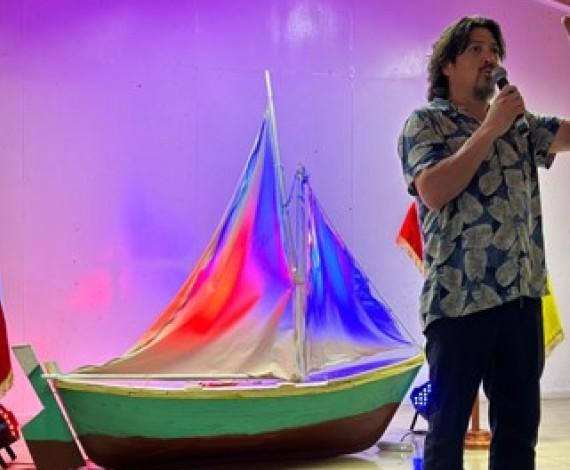
Juan: Well, Julio, first of all, thanks for taking the time to speak with me and being willing to have me write this story. Tell me a little bit about yourself, where are you from and what is your profession?
Julio: I am Julio Manuel Chamorro Solís, I am an islander from the Juan Fernández archipelago and Islands Desventuradas. We are 700 km (about 434.96 mi) from the coast of continental Chile on the Nazca Plate, we are not in South America here where I am. In Juan Fernández there are three islands which are the Robinson Crusoe Island, Santa Clara Island, and Alejandro Selkirk Island, and further north is the archipelago of the Desventuradas Islands, which is the San Félix and San Ambrosio Islands. These islands were discovered in the year 1574 and since then there have been several attempts to colonize these islands. When it was discovered, no native people lived on these islands. There were several colonization attempts and within those colonization attempts, my family arrived, which is one of the oldest families in Juan Fernandez. They arrived more or less around the year 1820. And I belong to a fishing family, my whole family have been fishermen, my father, my grandfather and my brother and nephew, all my ancestry have been fishers. I'm like a seventh or eighth generation fisherman and islander. My job is to oversee the office that does the biological monitoring of the fisheries and the ecosystem of the Juan Fernández archipelago and Desventuradas Islands. I work for the University of Concepción that executes this project through an appointment from the Chilean government and we have a research team of 12 people. That is my job, but apart from that, I belong to the local governance board, which is some social organizations from Juan Fernández that meet and were formed to work on the management plans for the Marine Protected Area. From this creation of the board of governance of this Marine protected area we now have Juan Fernández and Isla Desventuradas 7 marine park and a multiple-use coastal Marine protected area that has a total area of 600,000 km2. They are tremendous marine parks, the largest marine park in South America on the Pacific side. And well, I can tell you a lot of stories from here in Juan Fernandez. I could relate many things, but in biological terms we are the place in the world with the greatest marine biodiversity and with the highest biomass per square kilometer of marine species, but also in having an internationally recognized endemic flora and fauna. We have the highest endemism of vascular plants in the world, more than the Galapagos and any other known island. We are distant and we are far away and perhaps we are little known because we are in Chile.
Juan: Perfect, thank you. I was going to ask you how long you have been involved in fishing, but it sounds like a long time since you were very young, I am guessing. Is that right?
Julio: Yes, the fact of living on an island very far from mainland Chile means that islanders in general, not only on this island, but on many islands in the world, do many things related to the ocean. Asking an islander if he knows how to fish is like asking him if he knows how to swim or if he knows how to walk because here in Juan Fernández everyone fishes. Everyone fishes, regardless of whether your economic activity is fishing. For example, I am not a fisherman. That means that I don't live off fishing. My monthly income is not from fishing, but we all fish and I know how to fish, and I go fishing and I go to catch my food because I am an islander, so the relationship we have with the sea has been super close since we were born. We start young by making it our playground and then a place to get food, and so on.
Juan: I would like to hear your thoughts on the biggest challenges that you have seen as a fisherman or involved in small-scale fishing. Also, could you share how the attitudes regarding small-scale fisheries in your community or in Chile overall have changed?
Julio: The biggest challenge in Chile, and in our community, has been a paradigm shift in the way fisheries are considered. Generally, the world's fisheries are managed in a vertical way, where authoritative bodies mandate and tell you what you must do and how you must do it and when you must do it. And generally, the opinion of the primary user, who is the artisanal fisherman, who is on top of the boat, is not taken. In Chile, this meant changing the fishing law and creating management committees for fisheries that allowed artisanal fishermen and all those involved with fishing, be it the Academy, government agencies, decision makers, artisanal fishermen, industrial fishermen, to meet and talk about a specific fishery. This also opened co-management, as we call it, or shared management, and it was possible for all the actors to sit at a single table. Something that was not possible before.
Our community is quite conscious and respectful of nature, we have a very old fishery and a self-imposed measure from the beginning of the fishery that continues to this day and is generally one step ahead of national law. And it makes it difficult for us to be recognized by our traditional fishing systems or regulations that Chilean law does not recognize. For example, in Juan Fernández we have a maximum size of lobsters that can be caught, but the Chilean law does have a maximum size limit, it only requires that harvested lobster are above the minimum size limit. Sometimes there is no agreement between what the state wants or what the state says and what the communities say.
Juan: In terms of the environment. What have you seen that has been a challenge in your community around fishing? How have these environmental changes or challenges impacted the fishery?
Julio: Look there are two scenarios. The first challenge was to protect these waters because, as I told you previously, they are waters that are very bio diversely rich and with many endemic species. With a high level of endemism. Studies indicate that 98% of the fish observed in Juan Fernández are endemic. It is a very high number, so the first battle, or the first visible adversary, was industrial fishing occurring in Juan Fernández, where we witnessed that our seamounts were devastated along with the coral. So, the first environmental measure was to create these large marine protected areas, either a marine park or a multiple-use Marine Protected Area. So that industrial fishing was not allowed in these waters. And that was achieved thanks to a lot of management and a lot of community work, it was possible to decree these areas in several different governments. It was not just once, but three times, and we thought at the time that with that we were already somewhat protected from the changes that could occur in the environment. Thinking only of the industrial zone, but of course climate change is a reality, it is a reality that we see every day. The oceanic islands of the Pacific are the places that are going to be most impacted by climate change and we are seeing it already. Whether it is the dispersal of species, the appearance of new species, or the change of algal blooms. Changes in behavior of birds, changes in the intensity of winds and tidal waves. In other words, we see that, and the most explicit example is that today we have a plague, a large plague of black urchins, the long-spined urchin. That is destroying the kelp forests in Juan Fernández, but it is something that is not only documented in Juan Fernández. But the literature says that this began in Tasmania, on the island in South Australia, and began to move towards the Pacific. They are different species, they are all black urchins and well, they are different species. It passed through the French provenance, it reached Rapa Nui, it is now in Juan Fernández, and it is reaching the Chilean coasts as well. There is a serious problem with the appearance of these black urchins.
They threaten biodiversity because it is a super predatory species, just as there are species that are greatly affected by climate change and disappear. There are other species that are very resilient to climate change that adapt very quickly, and one species is the black sea urchin. Today it is documented in the United States, in the Canary Islands, throughout the Pacific, in various parts of the world, so it is one of the consequences of climate change and today we are trying to solve or mitigate this impact and we are looking for various alternatives, but we are just starting in this research process.
Juan: Do you think that learning networks can be useful to help combat environmental risks, and do you think that they can be useful to better manage small-scale fisheries?
Julio: Well, the experience we have in Chile with the learning network has turned out quite well, because it was born almost in conjunction with the conversation of management committees. So, the learning network is an instance where academia, decision-makers, artisanal fishermen and leaders to talk about fishing. Because in the learning network, decisions are not made but a conversation is had. The network can come up with a guideline or plan of how things could be managed, with the state being involved in some things. But it is already a very rich instance where they allowed us to connect. We live on an oceanic island; therefore, it is very difficult for us to share our experiences and connect with other fishermen. Chile is a very long country, it has more than 6,000 km (about 3728.23 mi) of coastline from Arica to the Chilean Antarctic. We have a great diversity of fishing, we have many different species and due to our geographic isolation, it does not allow us to communicate with other communities so easily. When it is time to talk with other fishermen is when we realize that many of us have the same problems, we have the same goals, we are very much in favor of sustainable fishing and creating marine protected areas to protect our activity.
Because all the fishermen who we visit and talk to have the same cultural issue, we have a special relationship with the sea, it is a cultural issue as well and not only an economic issue. There is a spiritual relationship with the sea as well. There is an important connection there that we don't want to lose, so we fully support this new vision of the way fisheries have to be managed. The learning network has allowed us to connect to be able to work towards this.
At the same time, in the case of Chile, it also allowed us to create nodes, because we realized that there were very different fisheries, but there were also very similar fisheries that had almost the same problems that we had and we were looking for the same solutions and that we were working on the same things in terms of marine protection. And from the learning network in Chile, the nodes were created. The crustacean node, the fishing and marine protected area node, the women in artisanal fishing node, the brown algae node were all created. This allowed us to work with other fishermen from other parts of Chile, but on very similar issues. For example, we catch lobster here in Juan Fernandez, but in southern Chile it is king crab and in western Chile it is jaiba. We are 3 fisheries very far from each other, but the 3 of us catch crustaceans, and we have different reproduction calendars.
Therefore, if one could negotiate with a crustacean buyer, for example in the United States. We could tell them, you know what from October to May, we can offer you lobster, from May to September, we can offer you king crab and from September to October we can offer you jaiba. Then there is already much better negotiation or communication power. And that is what the node allowed us to do. The network also allowed us to continue working during the pandemic, which was quite hard. Artisanal fishing in the world and especially in Chile, was quite impacted by this drop in production, we are a country that exports raw materials; therefore it suffered a lot. And this is where a local national market appeared and this also added value to the products, which the network also somehow facilitated it. The learning network has also served to show experience, but also to learn from the experience of other communities of things that sometimes, because you are in different places you do not have the idea of that solution and when you share this experience, you realize that it enriches the conversation with other fishing communities.
Juan: Do you think that these nodes and the different connections that have been made through the learning network could help to combat some environmental risks and have these nodes and connections allowed for the sharing of different strategies in the fight against environmental risks that we are seeing today?
Julio: Yes, of course. There was a lot of interest in the topic of fisheries certifications, but above all, the issue of creating a marine protected area, where fishermen can be part of the creation of the marine protected area, has been of great interest. We, in Juan Fernández, Rapa Nui, and in Port Raúl Marín Balmaceda, have decreed protected areas many years ago. We presented it in the learning network, in fact we are part of the artisanal fishing and marine protected area node. The issue is interesting because other fishing communities in Chile were encouraged to create more coastal marine protected areas. And we have already made several exchanges and some that already have results. We went to the north of Chile where there are several fishing communities there and about a month or a month and a half ago, they created the marine protected area of Pisagua.
In March of this year, we went to the Island of Melinka in the Guaitecas archipelago in southern Chile. They also invited us to Rapa Nui and Juan Fernández to talk to the fishermen, because they also want to create a multi-use marine protected area to protect their resources and have sustainable fishing. So, this communication and this opportunity that the learning network gives us is unique. It allows us to talk to each other and there is something that is very important and interesting, which is the treatment and discourse between fishermen. There is a distrust that fishermen have towards authoritative bodies, and I believe that this does not only happen in Chile, but I have also seen it in other places like Mexico for example, there is a natural distrust of authority. I don't know if it is an international or South American phenomenon, I have no idea, but there is a natural distrust of authority.
An authoritative body can go to a community of fishermen, and tell them, “you know creating a protected area is super good, you can manage it, and you will have a sustainable fishery”, but just because they are an authoritative body, ordinary fisherman will not listen or believe them.
What has worked the most for us, both, when we began to look for a model to create our protected area, as well as when we have gone to help in other communities. It is that from fisherman to fisherman there is a language and trust between them. When a fisherman talks to another fisherman from any other place in Chile, they kind of believe each other. They kind of say, “hey, this is how you can do things”, and they can tell you exactly the same thing that the authority tells you, but discourse and communication between fisherman and fisherman has much more results. There is a common language regarding the sea, a confidence regarding what the other fisherman is doing or saying, so the fisherman tends to believe another fisherman's results more than an authoritative body, and this is what has worked best for us. And this is one opportunity that the learning network has given us, it has been able to connect us with very isolated places.
Julio:
"One opportunity that the learning network has given us, it has been able to connect us with very isolated places."
Juan: What are some of the challenges you face as a fisherman? I know you've mentioned a few and I imagine there are many more, but what would be one of the biggest ones you see?
Julio: Look, we as a community of Juan Fernández have several big challenges. One is that the State recognizes our traditional fishing system, which is a concept that we have called the brand, which are fishing grounds that are more than 100 years old. We consider it as part of our heritage. In fact, these fishing grounds are inherited, sold, and traded because we consider them as part of the family patrimony, it is a system that we hope the Chilean State can recognize. And the other is that we be recognized, not only as the fishermen of Juan Fernández, but also the fishermen of Chile who have managed to decree Marine Protected Areas. That we be recognized and that the state treats us differently. Either with the state financing instruments or a subsidy. Because being a sustainable fisherman is expensive. Less polluting rope is more expensive, all fewer polluting materials are more expensive, four-stroke engines with electronic injection that put less fuel into the sea are much more expensive. So we want them to allow us and help us to be more sustainable fishermen with a different treatment with respect to the financing mechanisms that the state may have.
And the other thing is perhaps to achieve some type of certification for fisheries that are in marine protected areas. Fishing in a marine protected area is not the same as fishing in open waters without any type of regulation. Gaining some sort of certification system is also our greatest dream. And, the greatest of all is that they recognize us as a people as if we were on land because we are a people who have been here in the middle of the Pacific, since a couple of centuries ago. And we want them to treat us the same as if we were on mainland Chile.
Juan: How long have you been involved in the learning network in Chile?
Julio: From the very first meeting. I think it was back in 2016. I don't remember very well, but from the first.
Juan: And has the implementation of the learning network benefited you or your community?
Julio: Well, each community has its own objectives, we have our very clear objectives on fishing issues. But we have a law that brings us together, which is the fishing law as I told you before. The fishing law says that a management committee and management plans have to be put in place for each fishery. You will understand that a biodiverse place like this, in a single day, fishermen catch 30 to 40 different species of fish, lobster, octopus, etc., etc. Therefore, having a management plan for each of these species is crazy, and the state does not have the money to finance all those studies and all those management plans.
Therefore, the management committee has a management plan that is only about the lobster, the jurado, and the breca. Which are the 3 most important species, but we have 700 or so species.
Of those 700 there are 44 that are captured more constantly. The state of Chile cannot and does not have financing to make management plans for all these species' but thanks to the learning network and EDF, we managed to have a multi-species management plan for the 44 species that does not contemplate the management plan that the state has.
It is a job that we are doing together with the fishermen. We are ready to present it and hopefully get approved next month. But without the learning network and the support of EDF it would not have been possible to have this multi-species management plan for all species. This is called a multi-species management plan for forgotten fish in a context of climate change.
Juan: What are three things that you think are the most useful about the learning network?
Julio: Well, the most useful thing is that it connects us. It connects us to worlds that were not discussed before or were not united between the factors of the Academy, decision making and all those that I named before.
And the other thing is that although it is true. When one talks about the learning network in general, it is important to mention the creation of the nodes. It has made it possible to concentrate the efforts of similar fisheries to find common solutions and that has also been quite successful.
Juan: What is one thing you wish more people knew about learning networks?
Julio: Look, I think that there is still a cost issue that is not less than creating the network, making it work and meeting. It is a fairly large effort, I understand and know that there are many more and smaller communities that would like to participate in the network, but the network has a limit due to a financing issue, that is, EDF cannot finance all of Chile. It is something that the State of Chile or some more autonomous body should take on this responsibility and that does not mean that if an NGO does not have the money to be able to finance this travel, stay and food costs, that the network stops working, that is the worst thing that could happen.
Juan: Is there anything else that you would like to share about your experience with the learning network or about small-scale fisheries? Or anything in general that you would like to share?
Julio: Well, I believe that there is a serious debt of the state towards the primary food producers. Because both agriculture and fishing are essential for feeding this country and human nutrition in general. But when you see the conditions of the primary producers, the living conditions of the fishermen. You realize that it is a world where there is no Social Security. You see fishermen working until they are 75 or 80 years old because they do not have Social Security, that means that if you do not work you do not eat.
There is very little incentive to use new technologies, reduce the physical work that fishermen have to do, even in matters of safety at sea. Today we are in the year 2023, where all these kinds of things that one might think should be solved are not. I have noticed that both in Chile and in South America, no fisherman has Social Security. There are no State instruments for these types of primary food producers.
Juan: Thank you so much Julio for taking the time to speak with me today. I greatly appreciate the opportunity to speak with you and to learn about your story and experience. I am sure that this is information that can be useful for many people.
Julio: Of course, not a problem. Thank you.
This highlight story was written by Juan Camara, SSF Intern.
~
This article is part of the SSF Highlights series of articles published regularly to the SSF Hub. To read previous SSF Highlights, follow this link.

